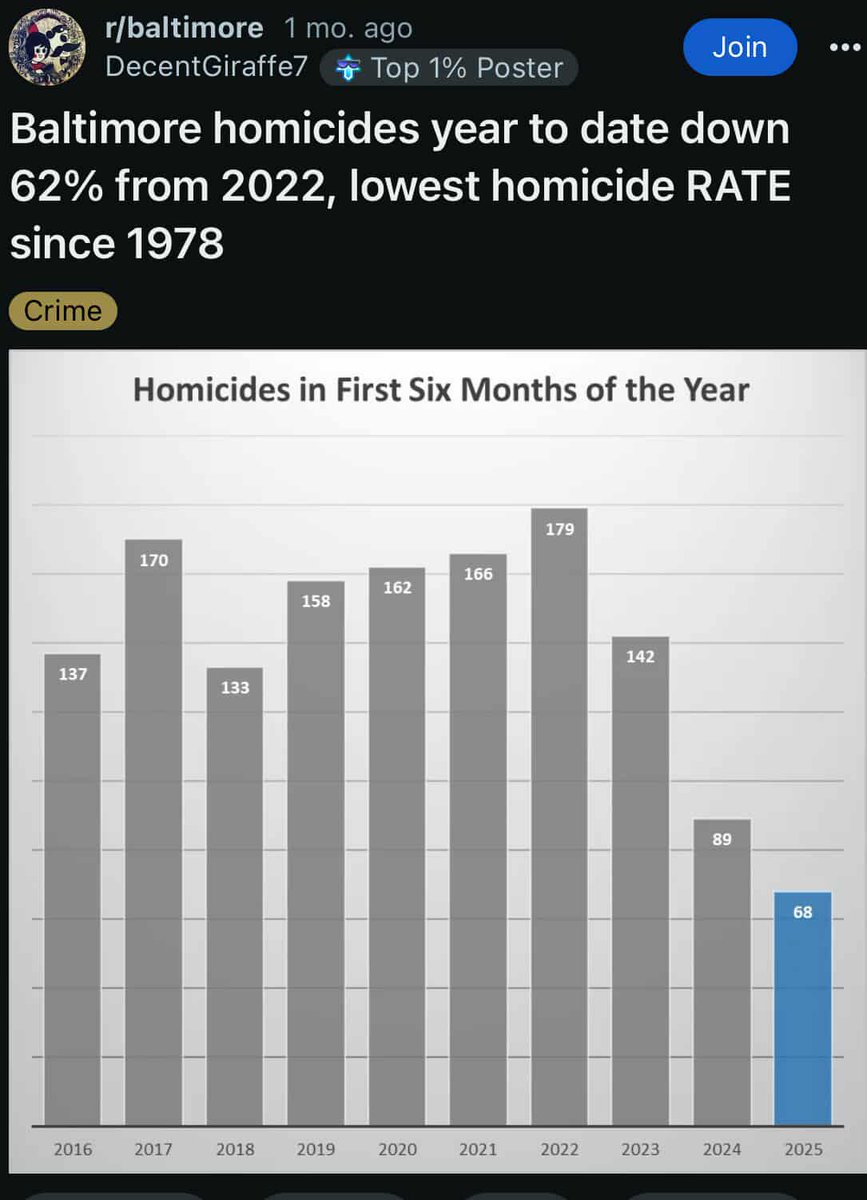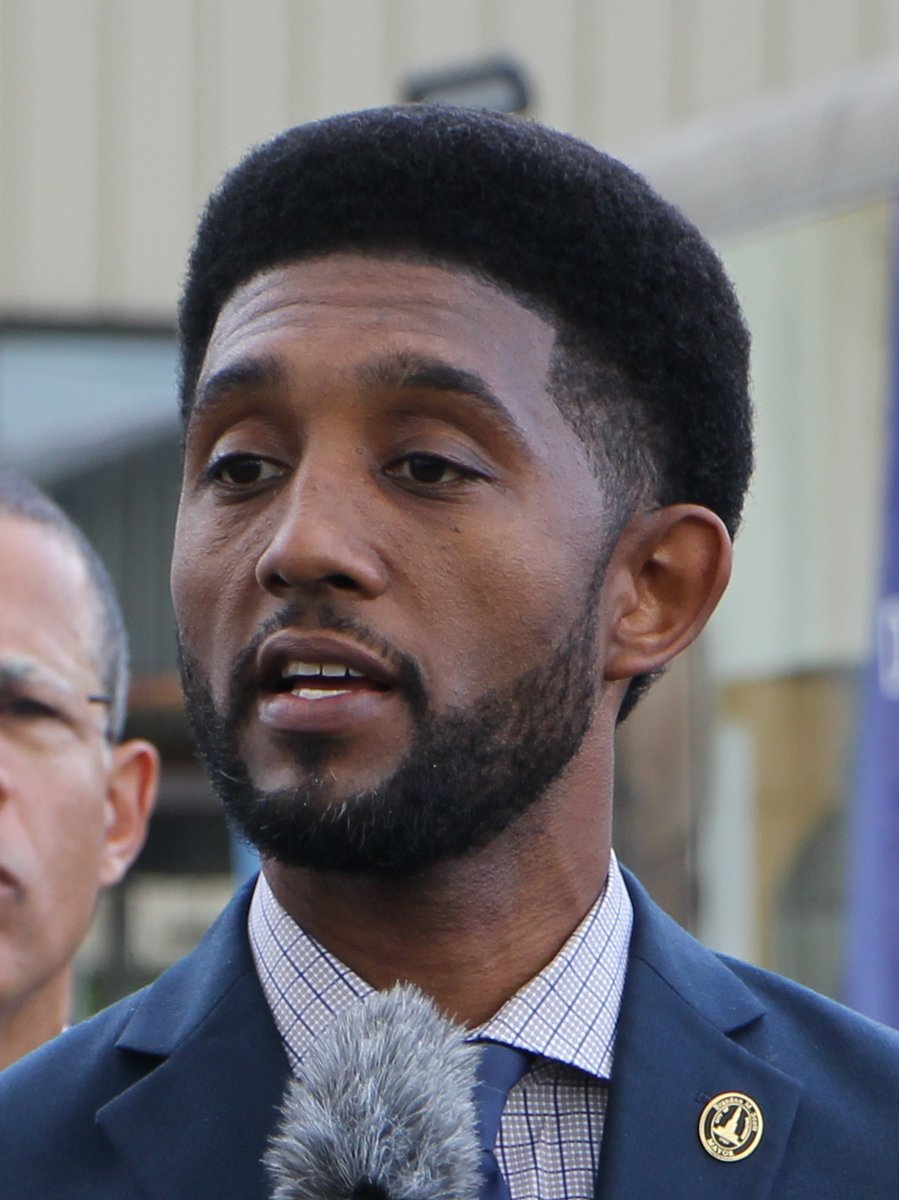"I taught a class [in which we read] Shelby Steele’s objections to affirmative action. It stigmatizes Black people as inferior & fills them with self-doubt in a mostly white setting; it makes them trade on their past of victimization; it doesn't improve life for most" of them. 🧵 

2)
"When I asked my students what they thought, one of the more activist-minded among them said that he agreed with everything that Steele said about affirmative action, which he thought shamed Black people. But, he added, with strong emotion, 'I hate Steele for saying it.'"
"When I asked my students what they thought, one of the more activist-minded among them said that he agreed with everything that Steele said about affirmative action, which he thought shamed Black people. But, he added, with strong emotion, 'I hate Steele for saying it.'"

3)
"The rest of the class agreed. Everyone disliked affirmative action and Shelby Steele in equal measure. It was a strange revelation, for all of us in that room knew that affirmative action had made this moment possible, both for me and for them, as Black undergrads."
"The rest of the class agreed. Everyone disliked affirmative action and Shelby Steele in equal measure. It was a strange revelation, for all of us in that room knew that affirmative action had made this moment possible, both for me and for them, as Black undergrads."
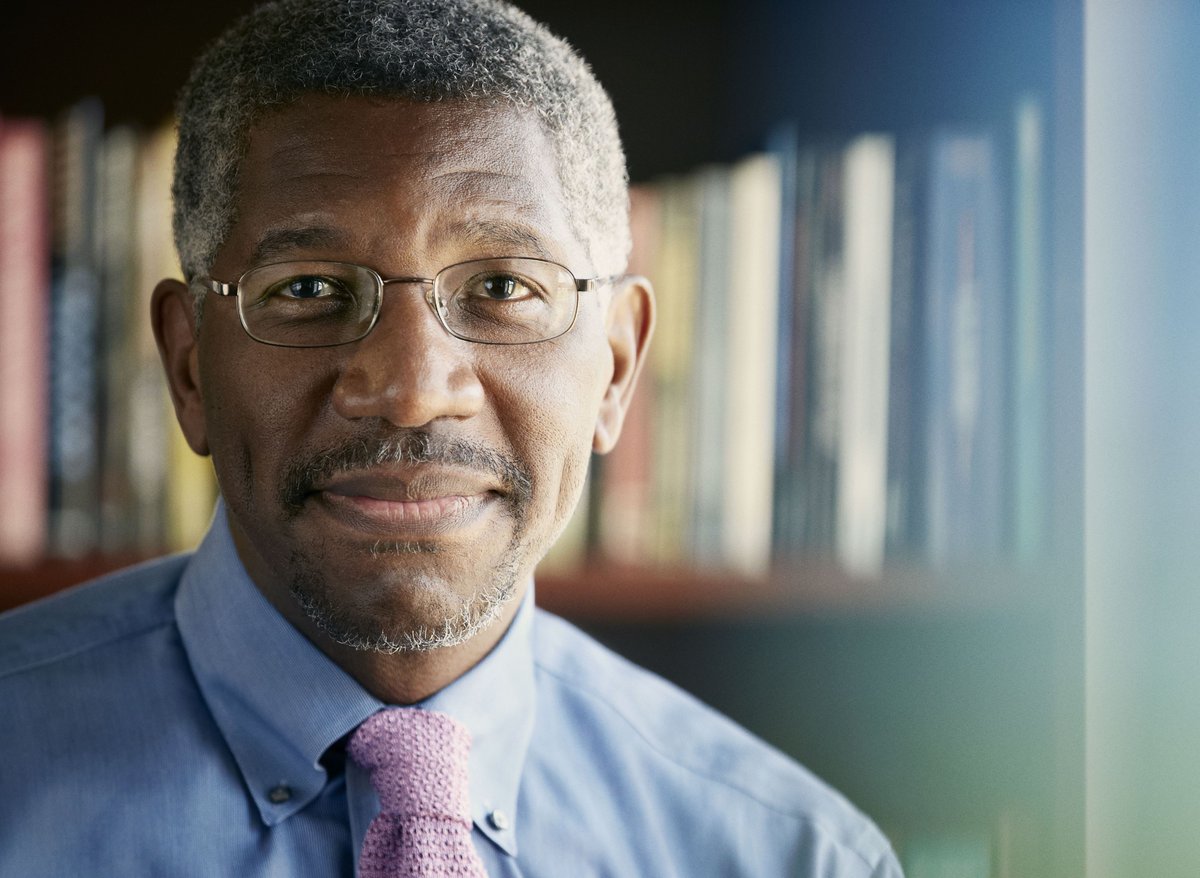
4)
"It was if the same realization struck us all: What does it mean that affirmative action brought us all here to criticize affirmative action? Why are we here? Therein lies a complex story of Black people’s feelings about affirmative action as both a gateway and a burden.
"It was if the same realization struck us all: What does it mean that affirmative action brought us all here to criticize affirmative action? Why are we here? Therein lies a complex story of Black people’s feelings about affirmative action as both a gateway and a burden.
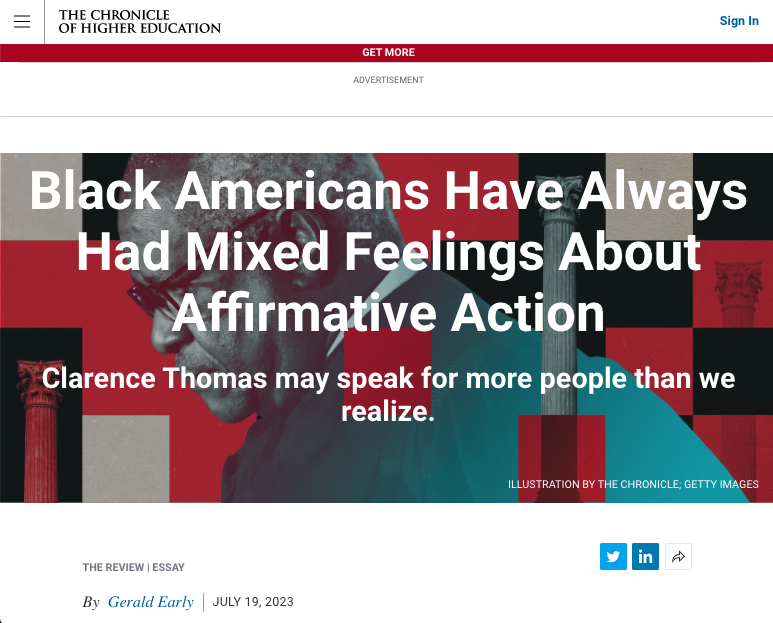
5)
"Black Americans have had ambivalent feelings about affirmative action since its inception in the 1960s. Though the extent and implications of the policy have changed radically over time, it has never benefited more than a small minority of Black people.
"Black Americans have had ambivalent feelings about affirmative action since its inception in the 1960s. Though the extent and implications of the policy have changed radically over time, it has never benefited more than a small minority of Black people.
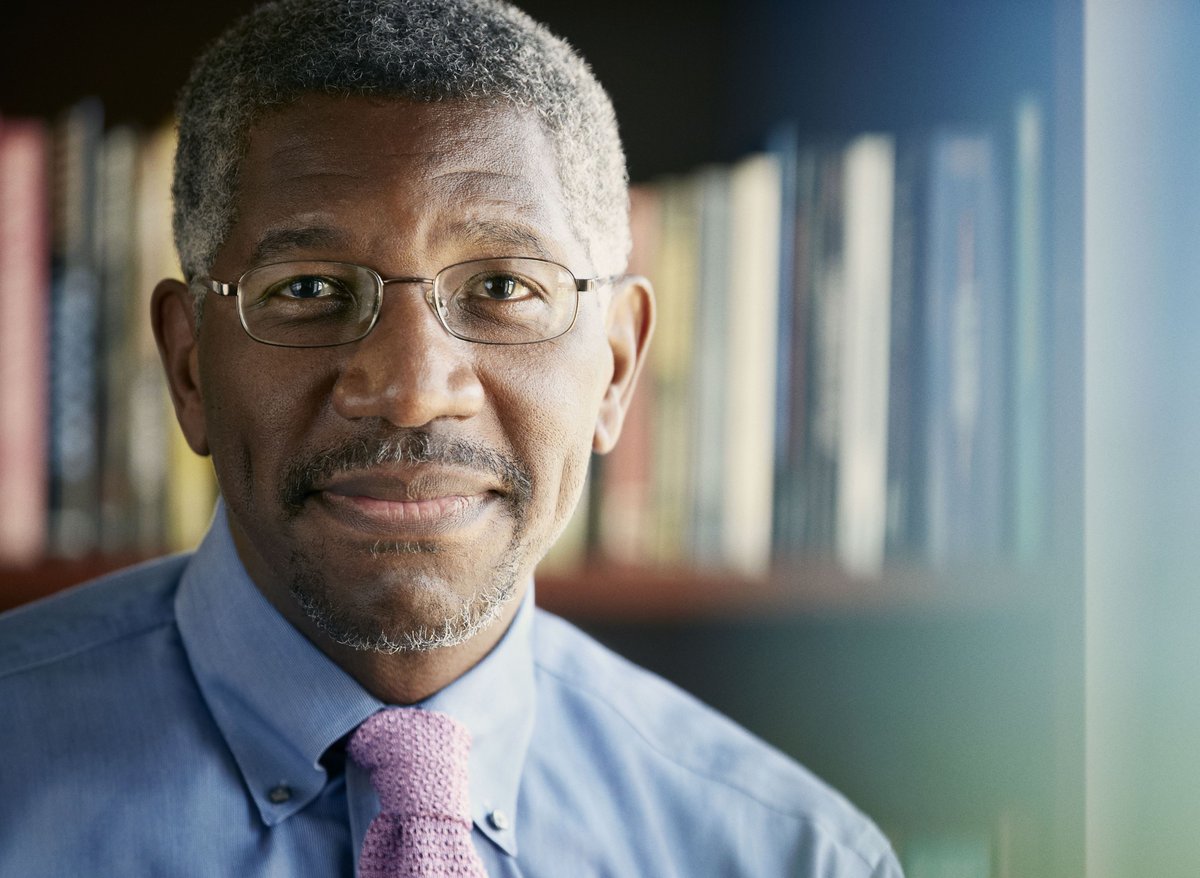
6)
"Yet its symbolic importance has been enormous, esp. in how it has affected the culture of higher ed. Once a few Black students were admitted to elite and prominently white universities, they began to exert pressure to admit more Black students and hire more Black faculty.
"Yet its symbolic importance has been enormous, esp. in how it has affected the culture of higher ed. Once a few Black students were admitted to elite and prominently white universities, they began to exert pressure to admit more Black students and hire more Black faculty.
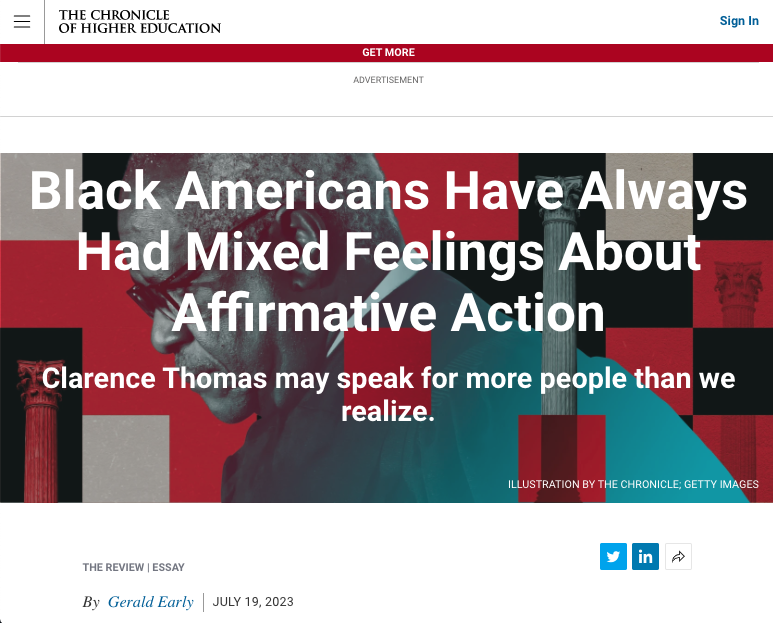
7)
"This was the fight against tokenism. The two populations of Black students and Black faculty were intertwined as a political force; together, they helped change higher ed. (The other major American institution as deeply affected by affirmative action has been the military.)
"This was the fight against tokenism. The two populations of Black students and Black faculty were intertwined as a political force; together, they helped change higher ed. (The other major American institution as deeply affected by affirmative action has been the military.)
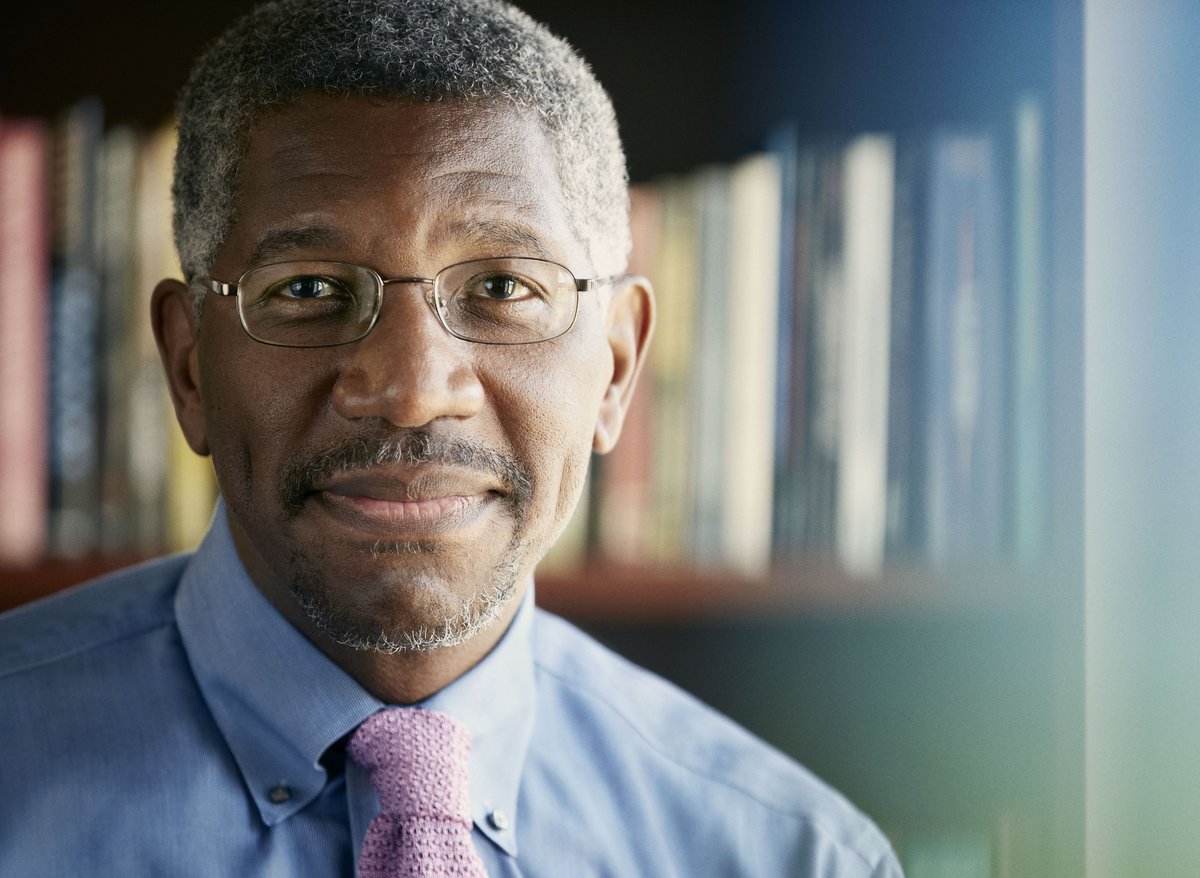
8)
"What made affirmative action important for so many Black people, despite the fact that comparatively few directly benefited from this rather boutique social policy, was that it changed the way we thought about where Black people could be or where they belonged.
"What made affirmative action important for so many Black people, despite the fact that comparatively few directly benefited from this rather boutique social policy, was that it changed the way we thought about where Black people could be or where they belonged.
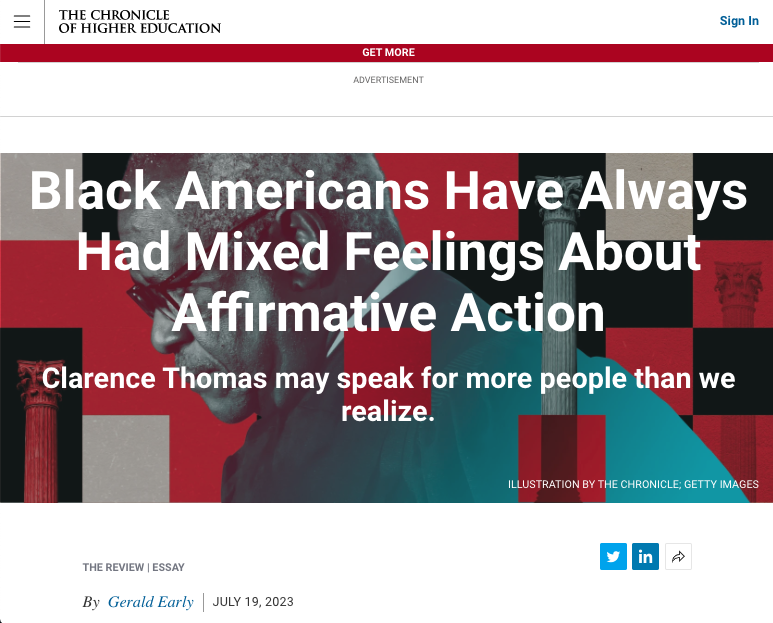
9)
"But if AA was viewed as a civil-rights victory by many Black people it never directly benefited, it often became a source of embarrassment for some it did. In college admissions, AA effectively protected Black students from competing against non-Black students.
"But if AA was viewed as a civil-rights victory by many Black people it never directly benefited, it often became a source of embarrassment for some it did. In college admissions, AA effectively protected Black students from competing against non-Black students.
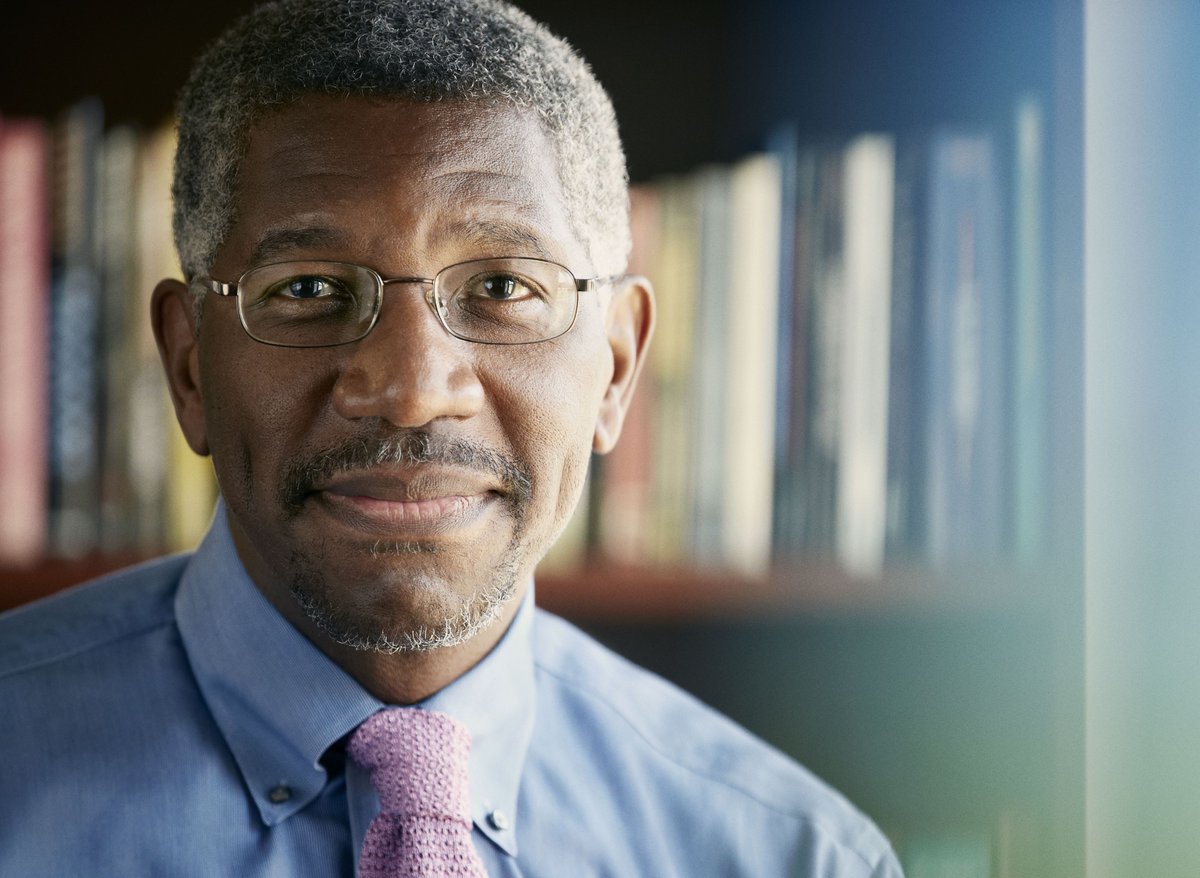
10)
"Black people felt stigmatized by AA because it came to mean that you had lesser qualifications—that you were admitted to a college or appointed to a job merely because of your race. In academe, a whole phalanx of jobs—including appointments in African American studies, ...
"Black people felt stigmatized by AA because it came to mean that you had lesser qualifications—that you were admitted to a college or appointed to a job merely because of your race. In academe, a whole phalanx of jobs—including appointments in African American studies, ...
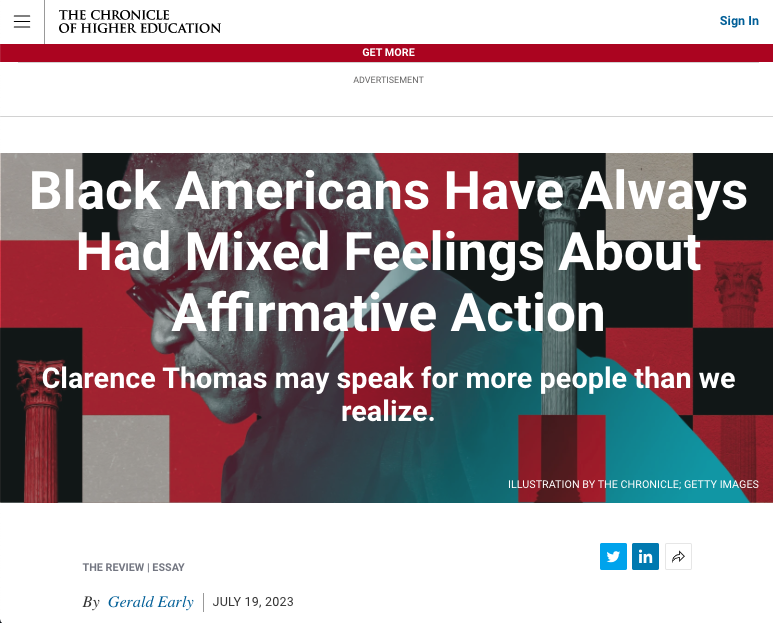
11)
"...in diversity, equity, and inclusion offices, and the like—became 'race' jobs, jobs that existed in part in order to diversify the campus. Many Black people do not hold these jobs in as high a regard as, say, being the dean of an engineering or medical school.
"...in diversity, equity, and inclusion offices, and the like—became 'race' jobs, jobs that existed in part in order to diversify the campus. Many Black people do not hold these jobs in as high a regard as, say, being the dean of an engineering or medical school.
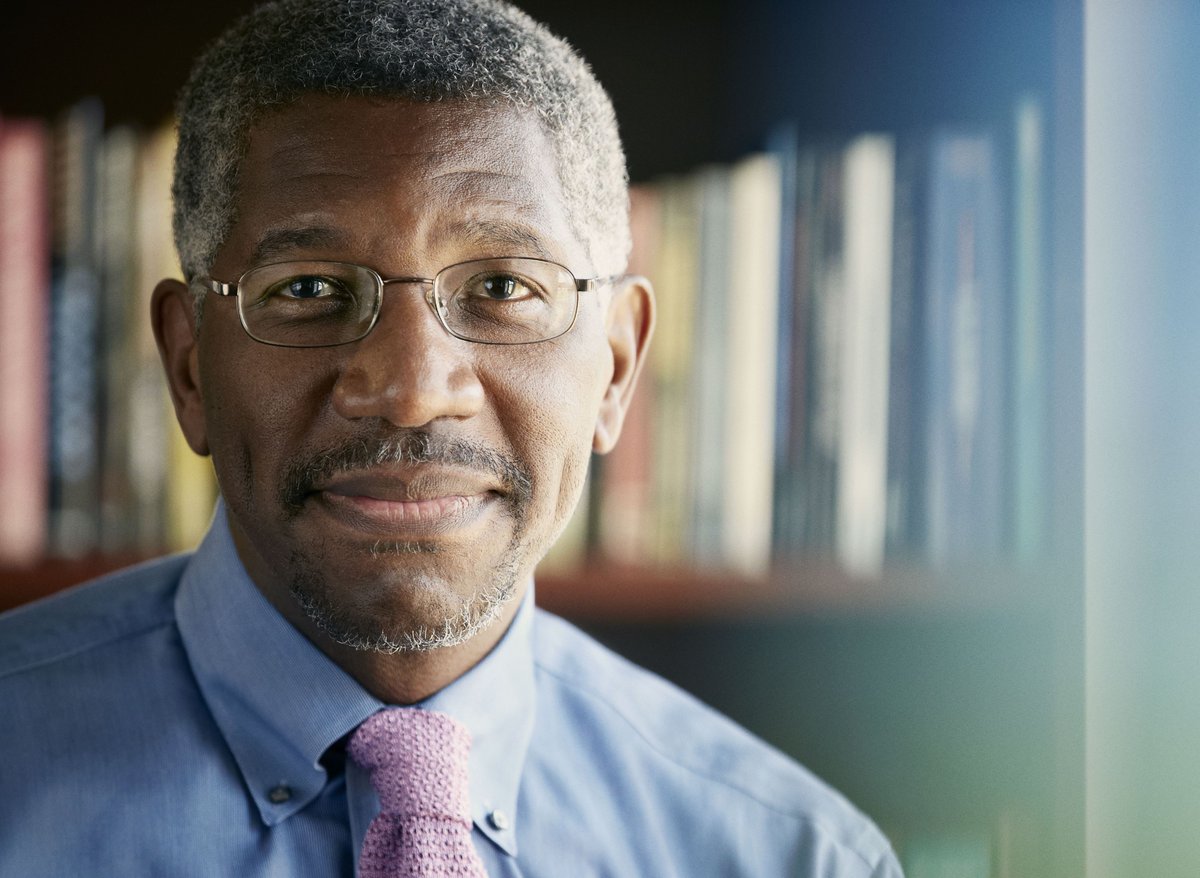
12)
"Many Black parents do not wish their children to major in or even take courses in African American studies, as they don’t think of it as a practical or prestigious field of study. But the phenomenon of 'race herding' on college campuses—students and faculty of color...
"Many Black parents do not wish their children to major in or even take courses in African American studies, as they don’t think of it as a practical or prestigious field of study. But the phenomenon of 'race herding' on college campuses—students and faculty of color...
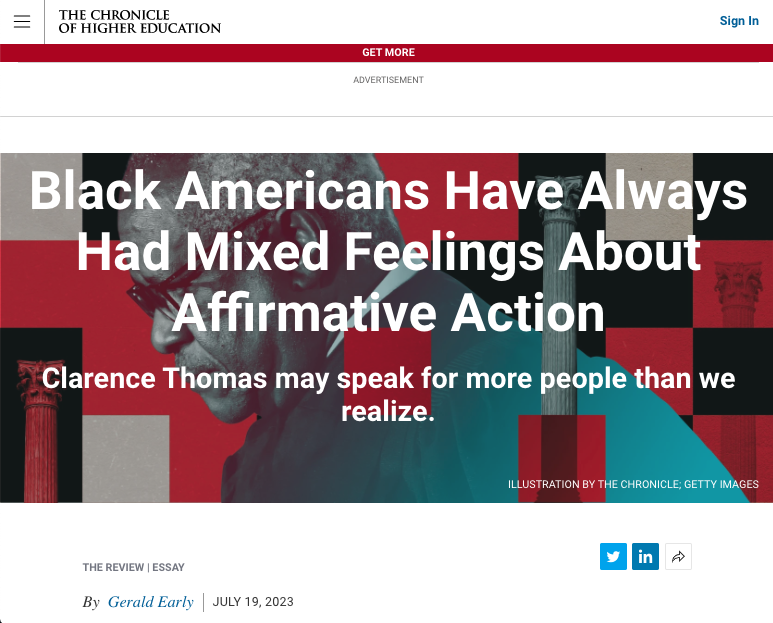
13)
"...clustering in disciplines directly related to race—is partly misunderstood: Colleges, by their administrative nature, tend to encourage cliques as vectors of power. Black people are just conforming to the environment, by using the element that got us in: our race.
"...clustering in disciplines directly related to race—is partly misunderstood: Colleges, by their administrative nature, tend to encourage cliques as vectors of power. Black people are just conforming to the environment, by using the element that got us in: our race.
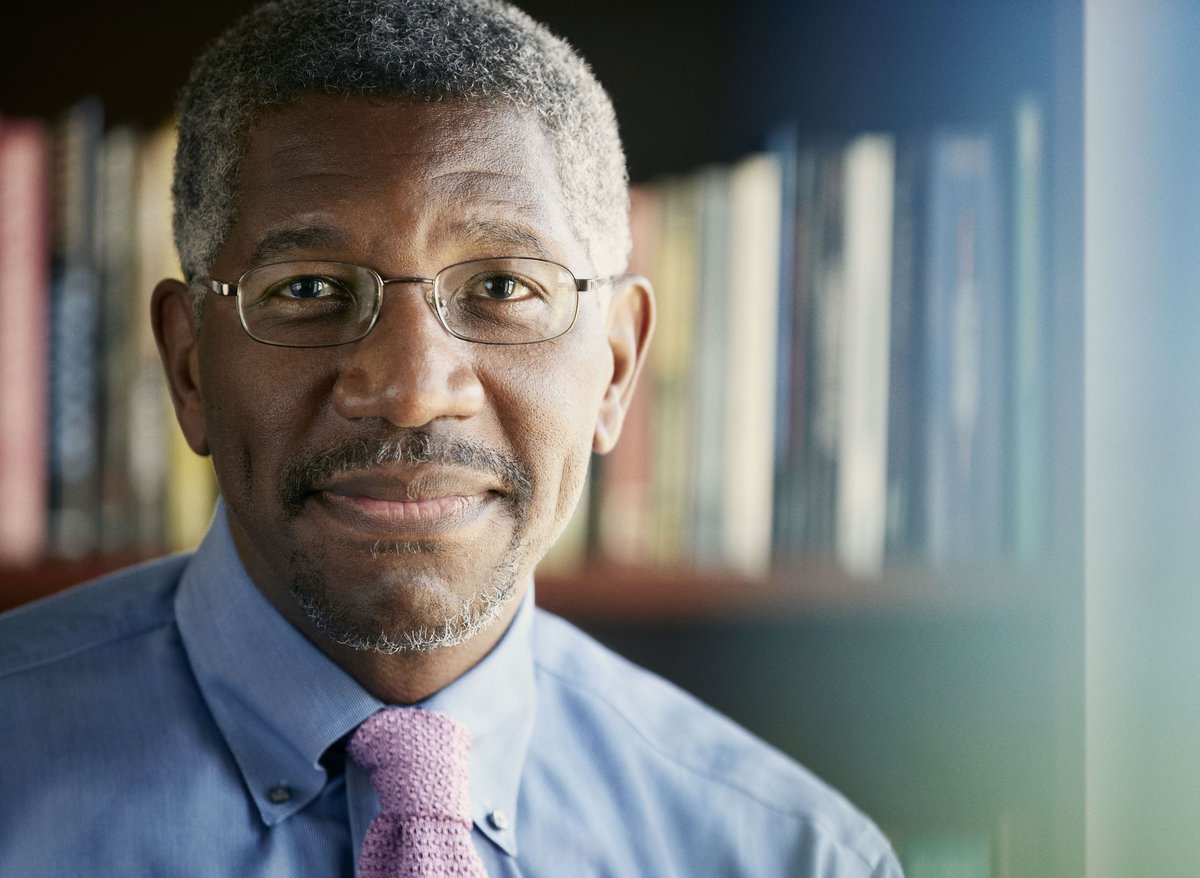
14)
"This institutional development over the past 50 years has made some Black people feel uneasy about, if not ashamed of, AA, and led many Black elites on both the right and the left to deny that they ever benefited from it.
"This institutional development over the past 50 years has made some Black people feel uneasy about, if not ashamed of, AA, and led many Black elites on both the right and the left to deny that they ever benefited from it.
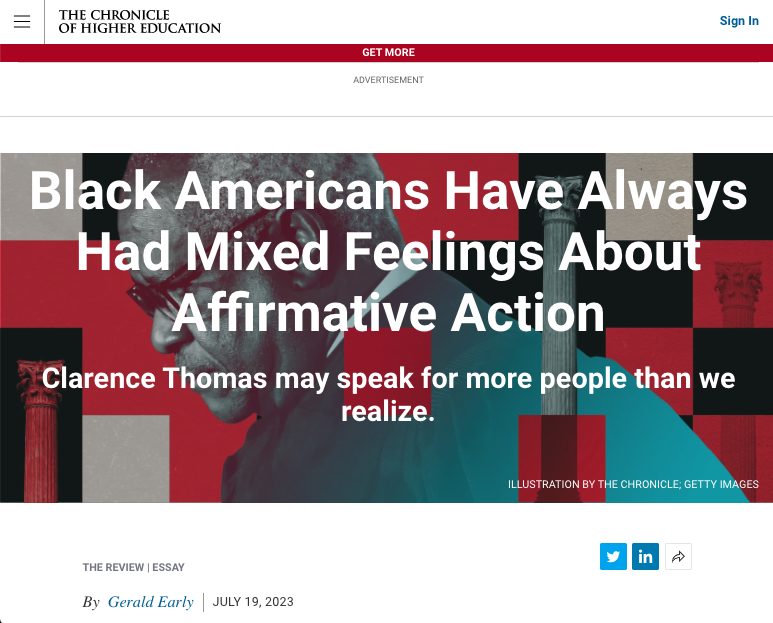
15)
"How can one feel pride in winning something that perversely acknowledges, or even rewards, your historically induced inadequacies? Affirmative action seems to say not just that racism persists, but that there is—still—something lacking in Black life.
"How can one feel pride in winning something that perversely acknowledges, or even rewards, your historically induced inadequacies? Affirmative action seems to say not just that racism persists, but that there is—still—something lacking in Black life.
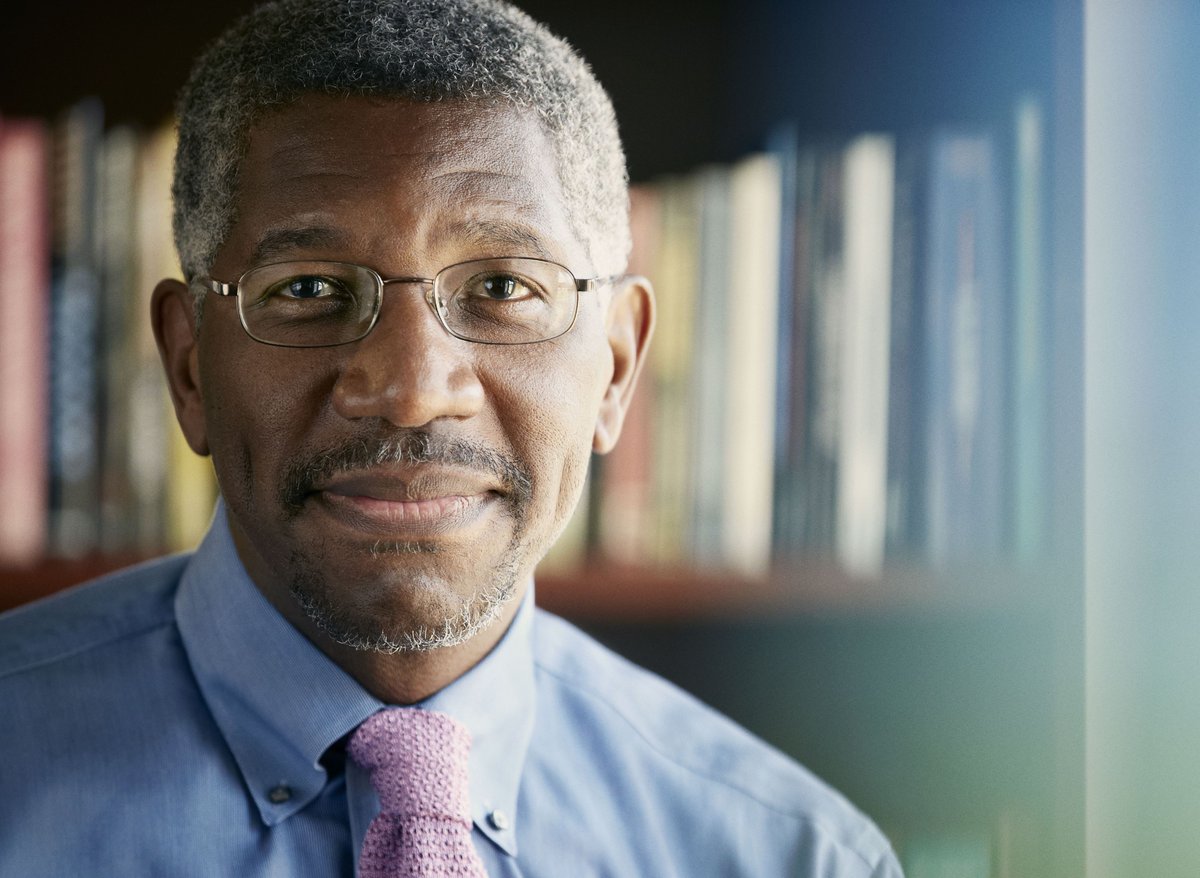
16)
"While the liberal-leaning Black majority has always had mixed feelings about affirmative action, Black conservatives have been virtually unanimous in opposing it. Indeed, they have had to, if they wanted to be taken seriously by their White conservative allies.
"While the liberal-leaning Black majority has always had mixed feelings about affirmative action, Black conservatives have been virtually unanimous in opposing it. Indeed, they have had to, if they wanted to be taken seriously by their White conservative allies.
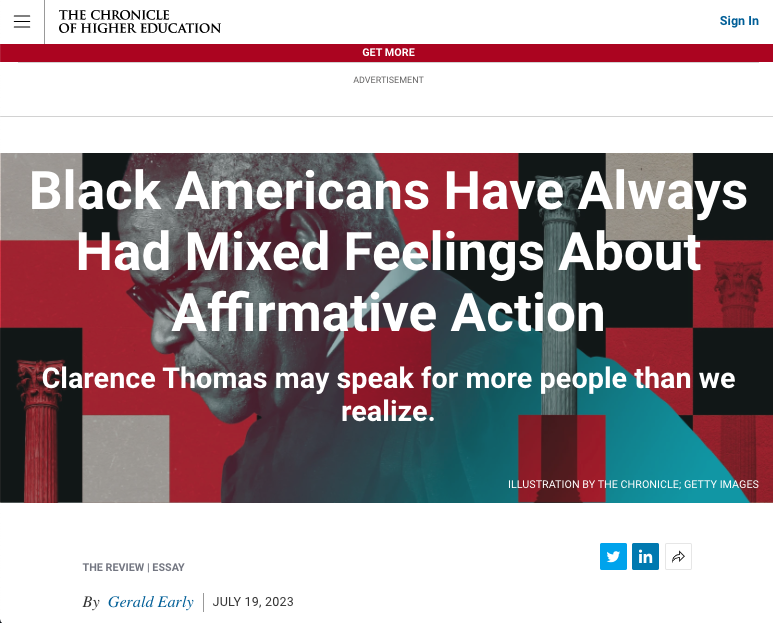
17)
"As Justice Clarence Thomas, the most prominent Black conservative in the country, wrote in his 1991 essay, 'The Loneliness of the Black Conservative': 'For blacks the litmus test' for conservatism 'was fairly clear. You must be against affirmative action and welfare.'
"As Justice Clarence Thomas, the most prominent Black conservative in the country, wrote in his 1991 essay, 'The Loneliness of the Black Conservative': 'For blacks the litmus test' for conservatism 'was fairly clear. You must be against affirmative action and welfare.'
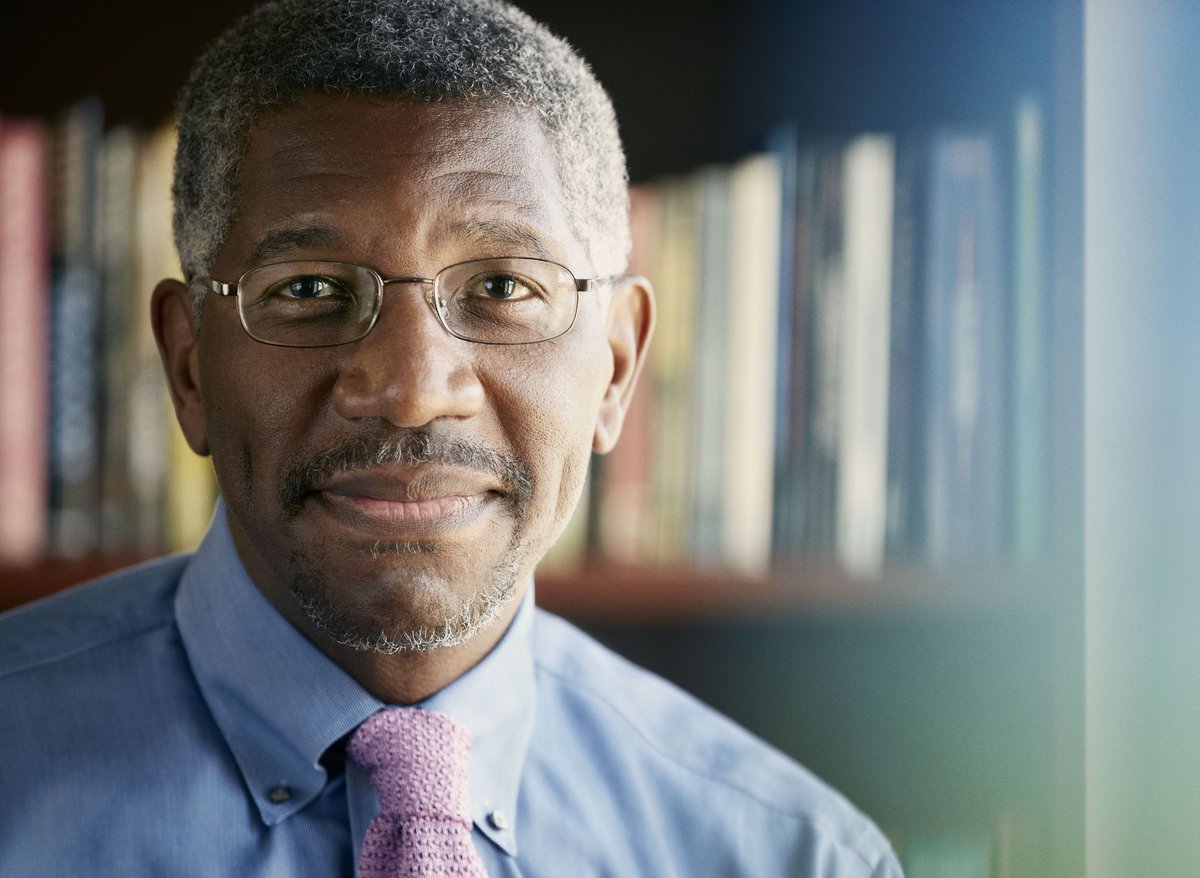
18)
"Because Black conservatives were looked upon with suspicion by their white counterparts, suspected of prioritizing racial self-interest above ideology, they had to constantly prove themselves. This pressure was intensified by the fact that Black conservatives had little...
"Because Black conservatives were looked upon with suspicion by their white counterparts, suspected of prioritizing racial self-interest above ideology, they had to constantly prove themselves. This pressure was intensified by the fact that Black conservatives had little...
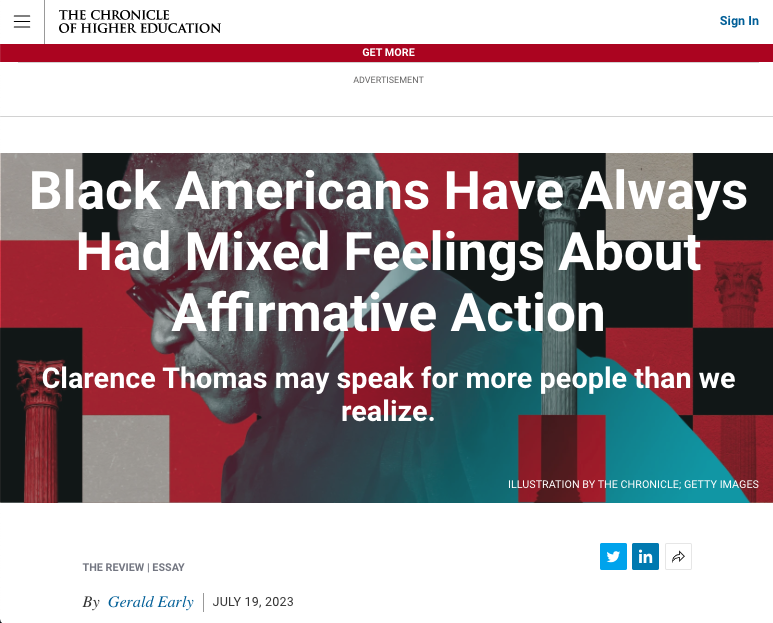
19)
"...leverage among conservatives, as so few Black people voted GOP. Black conservatives did not bring any sizable constituency with them. Of course, to have Black conservatives espouse policies that white conservatives supported protected them from the charge of racism.
"...leverage among conservatives, as so few Black people voted GOP. Black conservatives did not bring any sizable constituency with them. Of course, to have Black conservatives espouse policies that white conservatives supported protected them from the charge of racism.
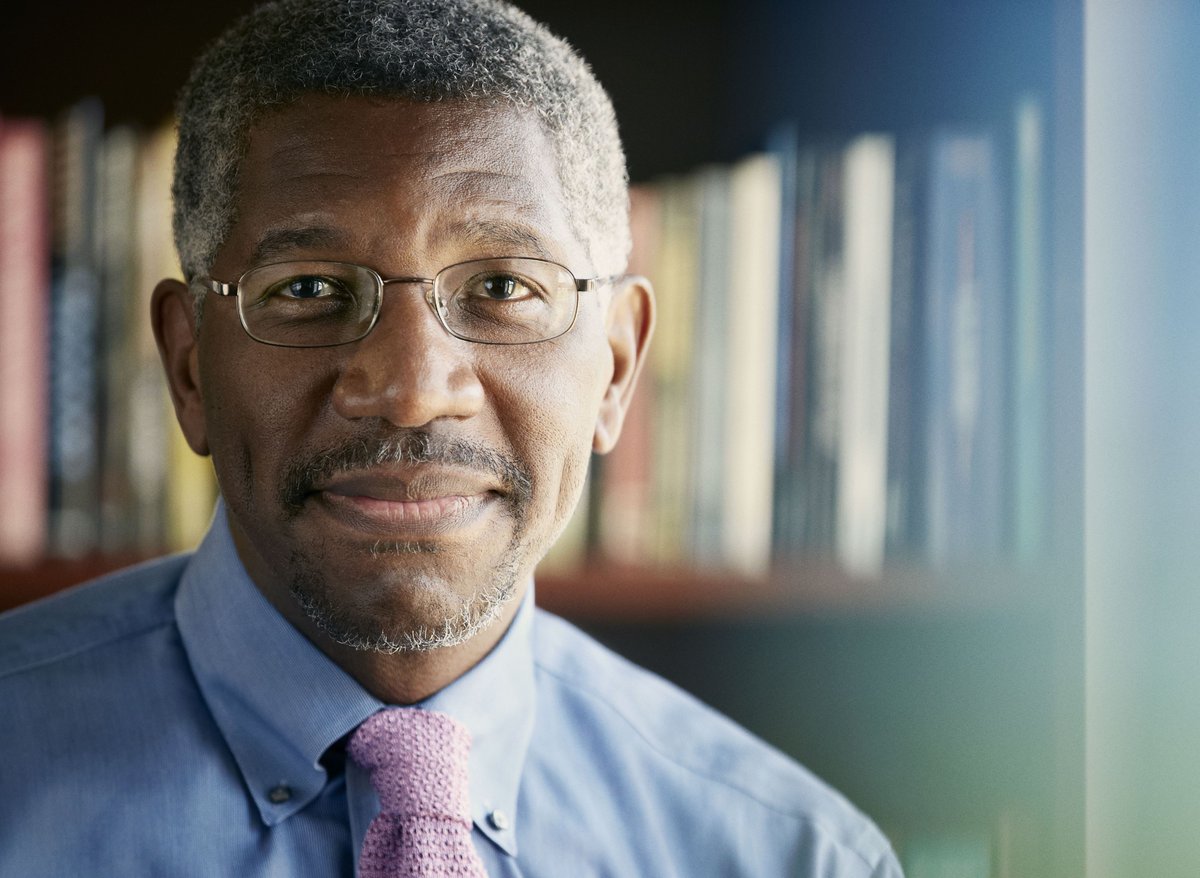
20)
"For Thomas, opposition to AA is a not merely a test of conservative allegiance but a principle to be defended against the wrong-headedness of Black liberalism. His concurrence to the majority decision in Students for Fair Admissions Inc. v. Harvard College is...
"For Thomas, opposition to AA is a not merely a test of conservative allegiance but a principle to be defended against the wrong-headedness of Black liberalism. His concurrence to the majority decision in Students for Fair Admissions Inc. v. Harvard College is...
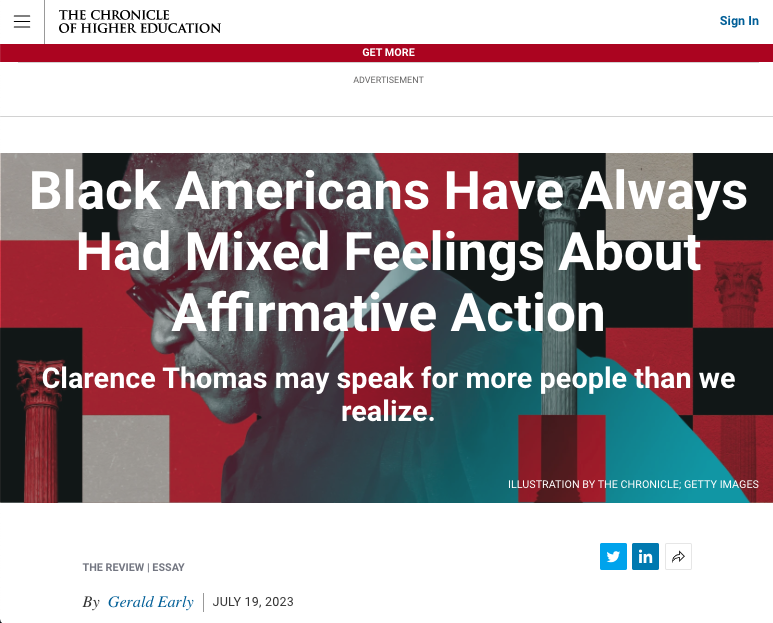
21)
"...a full-throated denunciation of AA as a shameful and cynical form of institutionalized special pleading on behalf of Black people. He advances the paradoxical position that Black Americans can best press their claims by behaving as if we had no racial grievances and...
"...a full-throated denunciation of AA as a shameful and cynical form of institutionalized special pleading on behalf of Black people. He advances the paradoxical position that Black Americans can best press their claims by behaving as if we had no racial grievances and...
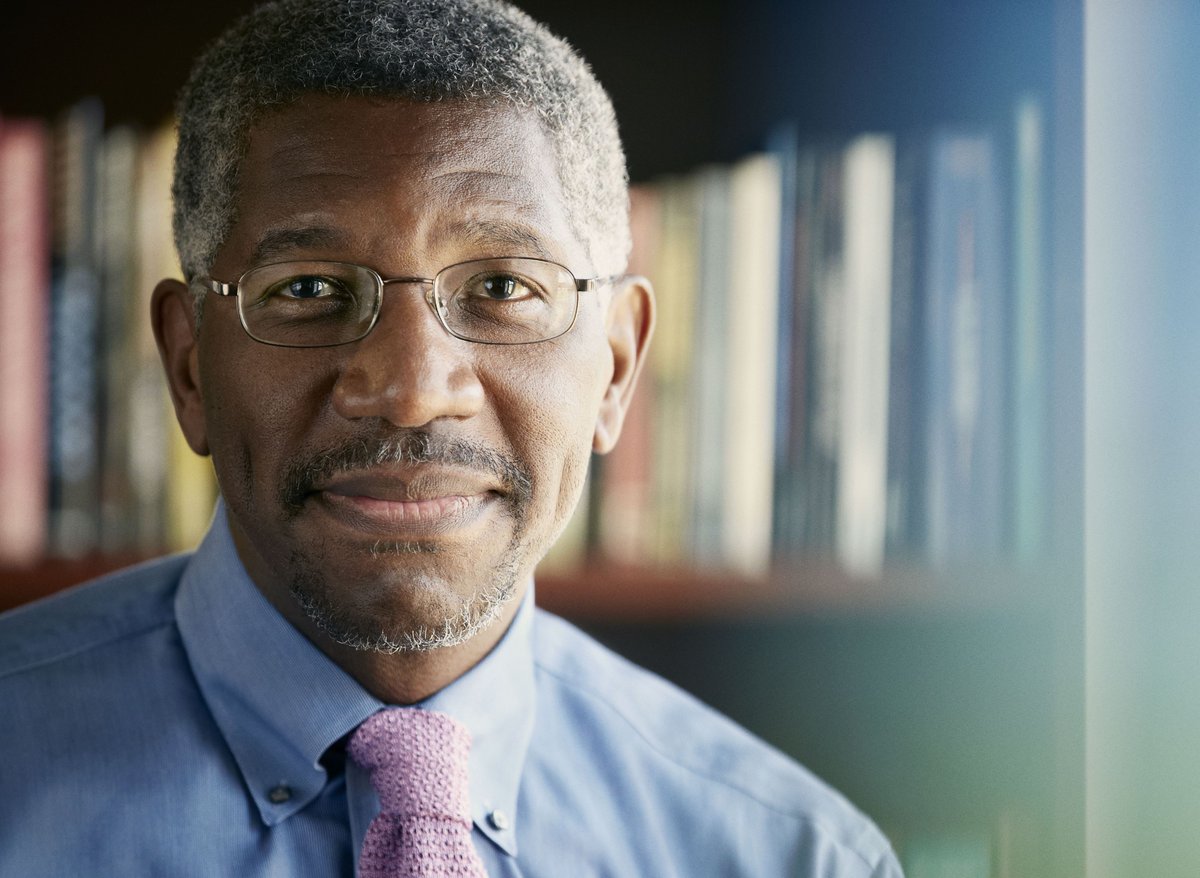
22)
"...accepting the basic aspirational fairness of a colorblind society.
Thomas argues that 'the Constitution continues to embody a simple truth: Two discriminatory wrongs cannot make a right.'
"...accepting the basic aspirational fairness of a colorblind society.
Thomas argues that 'the Constitution continues to embody a simple truth: Two discriminatory wrongs cannot make a right.'
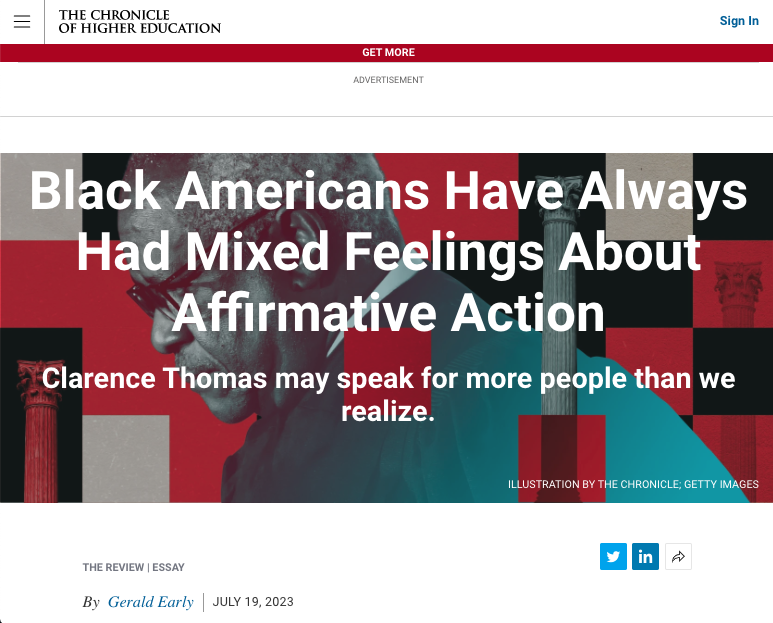
23)
"The U.S. Constitution does not allow punitive racial discrimination, but it also does not permit, as the dissenters argue, any sort of compensatory racial discrimination as amelioration for past discrimination. It does not permit racial discrimination—period.
"The U.S. Constitution does not allow punitive racial discrimination, but it also does not permit, as the dissenters argue, any sort of compensatory racial discrimination as amelioration for past discrimination. It does not permit racial discrimination—period.
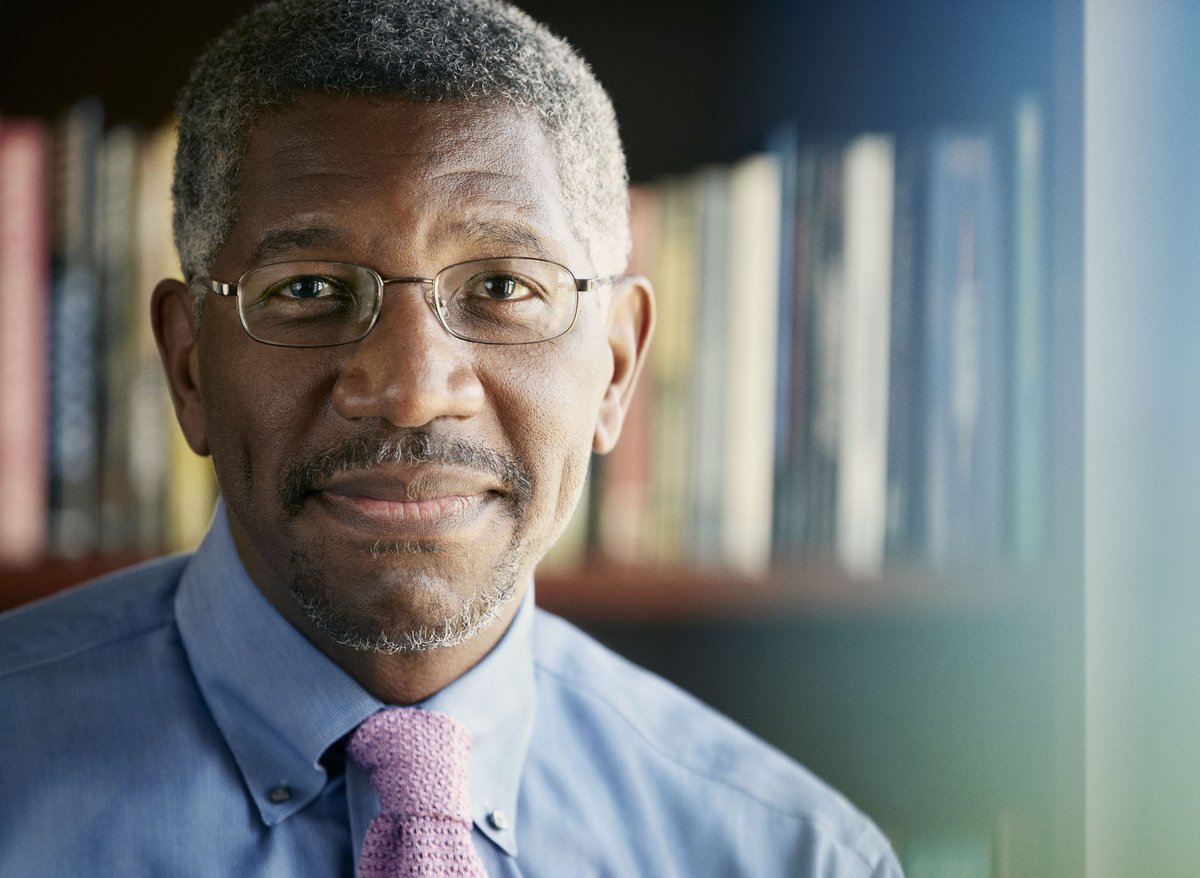
24)
"There are two overall points that Thomas makes. The first is the legal one about the constitutionality of racial discrimination. The second is social and practical, regarding whether discriminating in favor of a racial group really winds up helping that group.
"There are two overall points that Thomas makes. The first is the legal one about the constitutionality of racial discrimination. The second is social and practical, regarding whether discriminating in favor of a racial group really winds up helping that group.
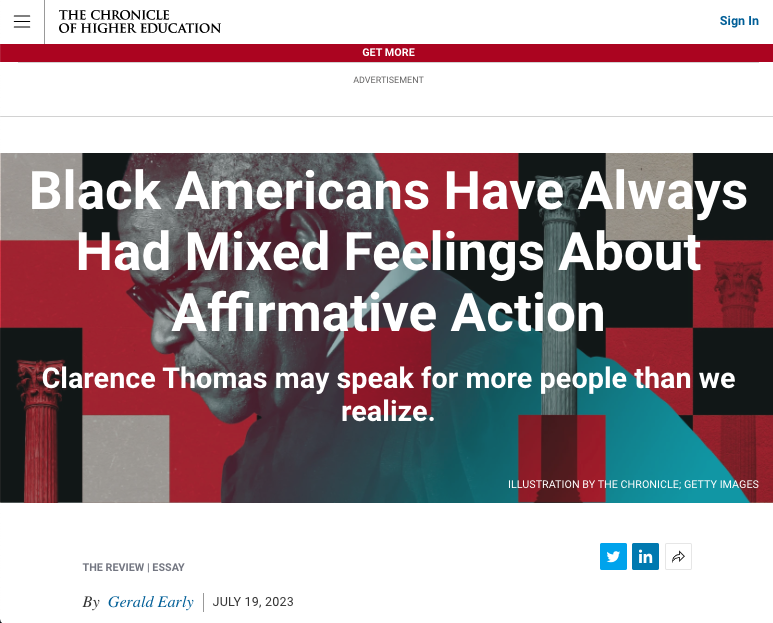
25)
"The dissenters argue that affirmative action is ‘good for black students.' Thomas is expressing doubt that Black Americans can only achieve their full citizenship claims through racially specific emoluments. That belief is not only specious but has damaged Black people.
"The dissenters argue that affirmative action is ‘good for black students.' Thomas is expressing doubt that Black Americans can only achieve their full citizenship claims through racially specific emoluments. That belief is not only specious but has damaged Black people.
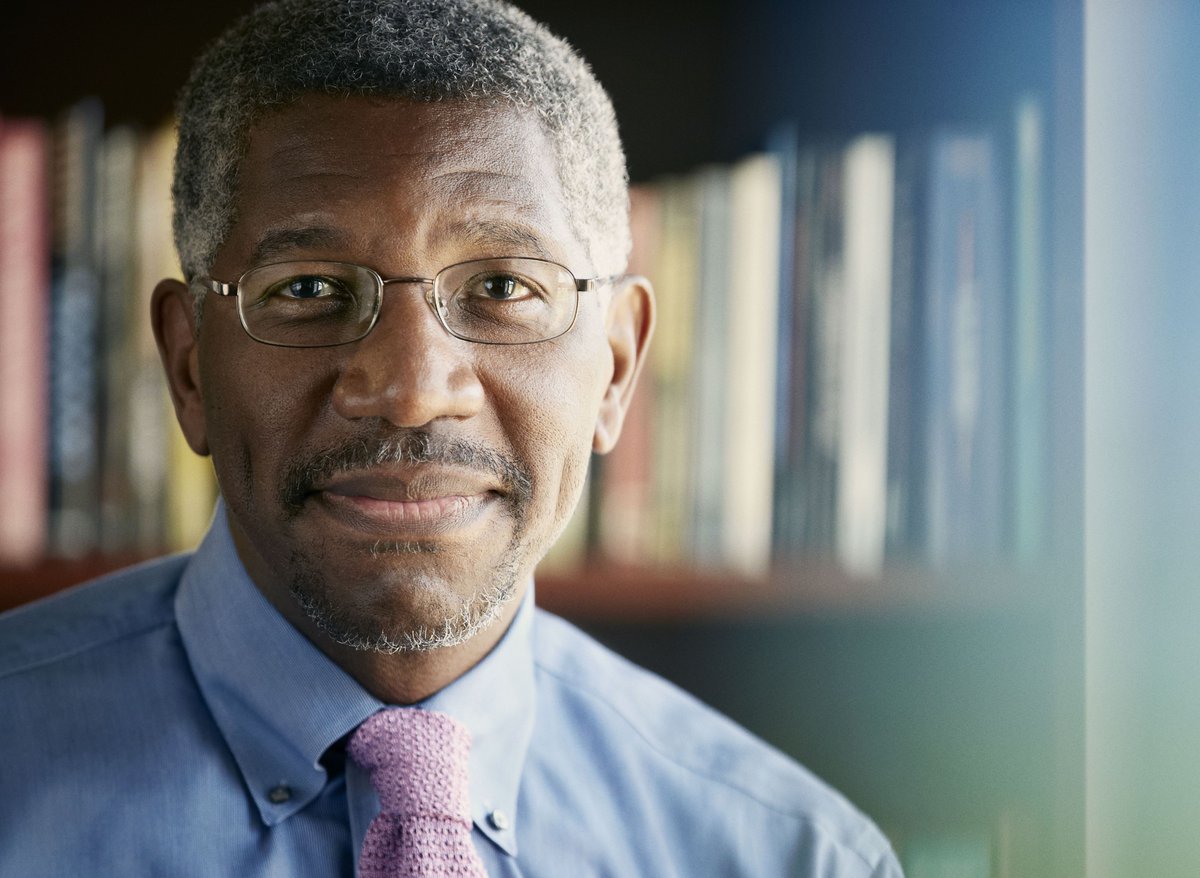
26)
"Thomas characterizes Jackson’s linkage of slavery and white inherited wealth as locking Black people into a 'seemingly perpetual inferior caste' as 'an insult to individual achievement and cancerous to young minds seeking to push through barriers, rather than...victimhood.'
"Thomas characterizes Jackson’s linkage of slavery and white inherited wealth as locking Black people into a 'seemingly perpetual inferior caste' as 'an insult to individual achievement and cancerous to young minds seeking to push through barriers, rather than...victimhood.'
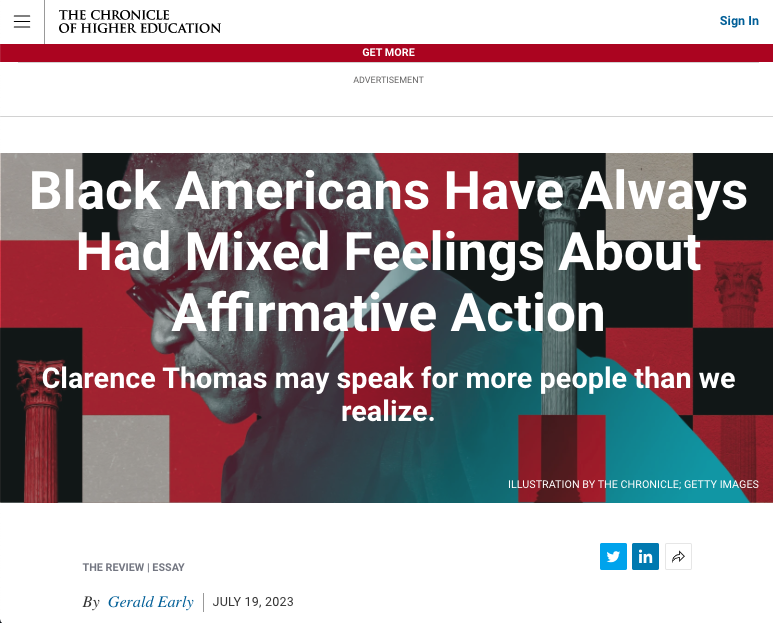
27)
"Thomas emphasizes his intense dislike of racial categories, which he thinks 'are little more than stereotypes.' Orlando Patterson strikes a different chord: 'Racial categorization is a fact of American life, one that we can do away with only by first acknowledging it.'
"Thomas emphasizes his intense dislike of racial categories, which he thinks 'are little more than stereotypes.' Orlando Patterson strikes a different chord: 'Racial categorization is a fact of American life, one that we can do away with only by first acknowledging it.'
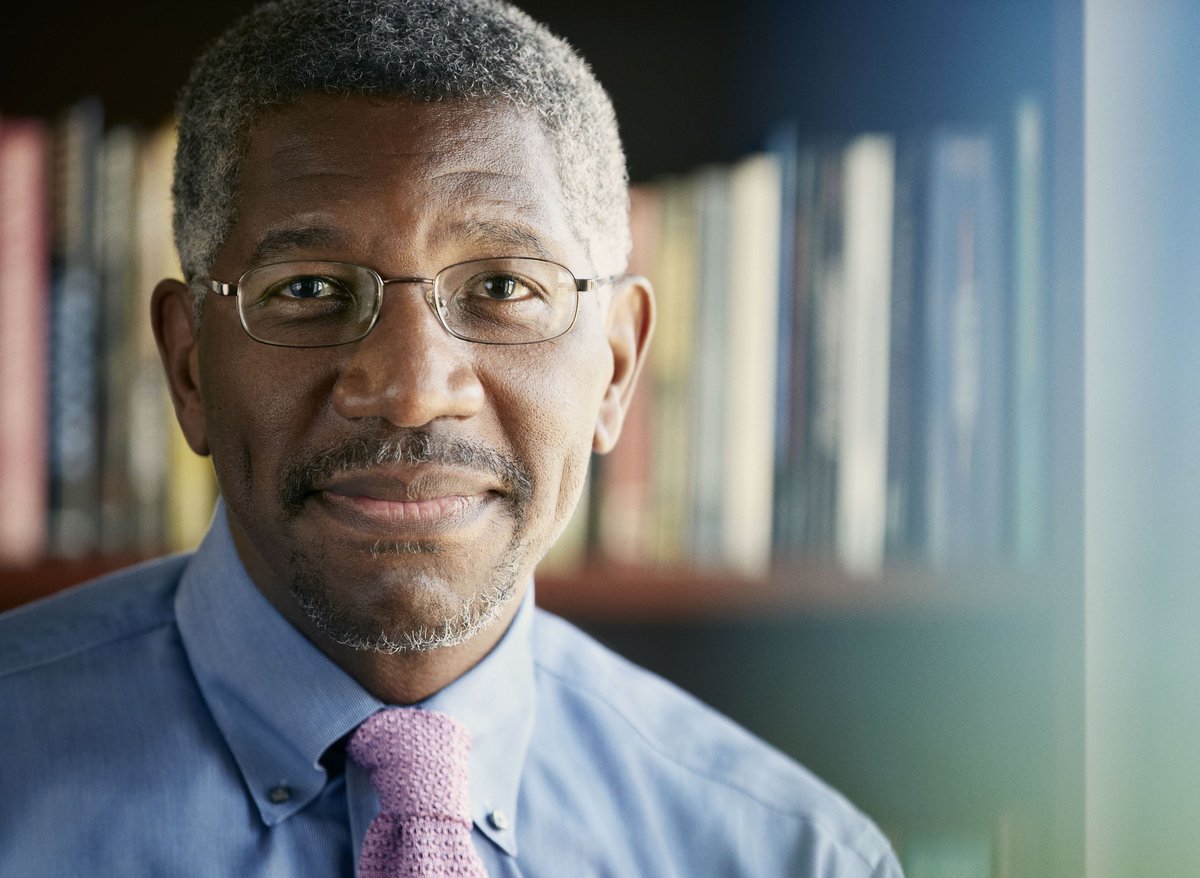
28)
"Patterson’s view, like those of many other supporters of affirmative action, is that the virus that made you ill can be made into the vaccine that cures you. But if racism is evil, Black conservatives like Thomas would argue, how can the fruits of racism be good?
"Patterson’s view, like those of many other supporters of affirmative action, is that the virus that made you ill can be made into the vaccine that cures you. But if racism is evil, Black conservatives like Thomas would argue, how can the fruits of racism be good?
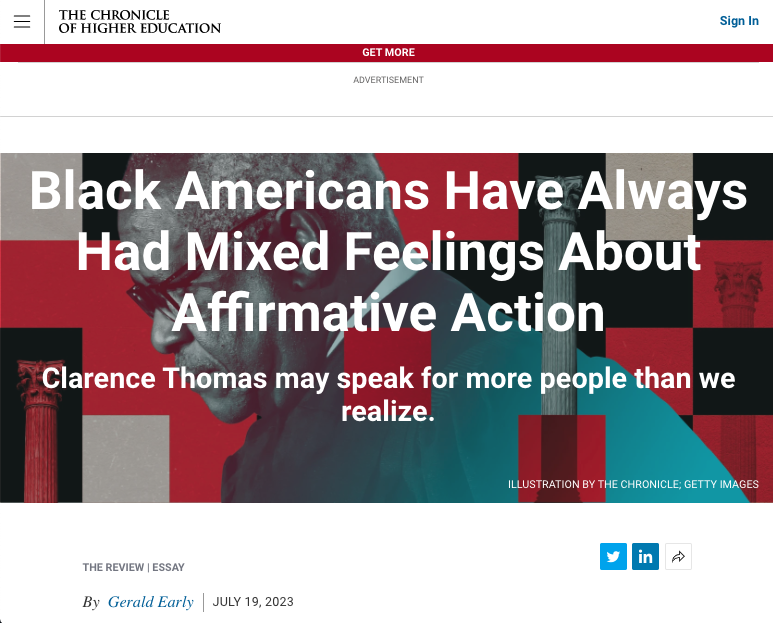
29)
"To think as Patterson and other Black liberals do validates the logic of racism as something that can be manipulated but never transcended.
"To think as Patterson and other Black liberals do validates the logic of racism as something that can be manipulated but never transcended.
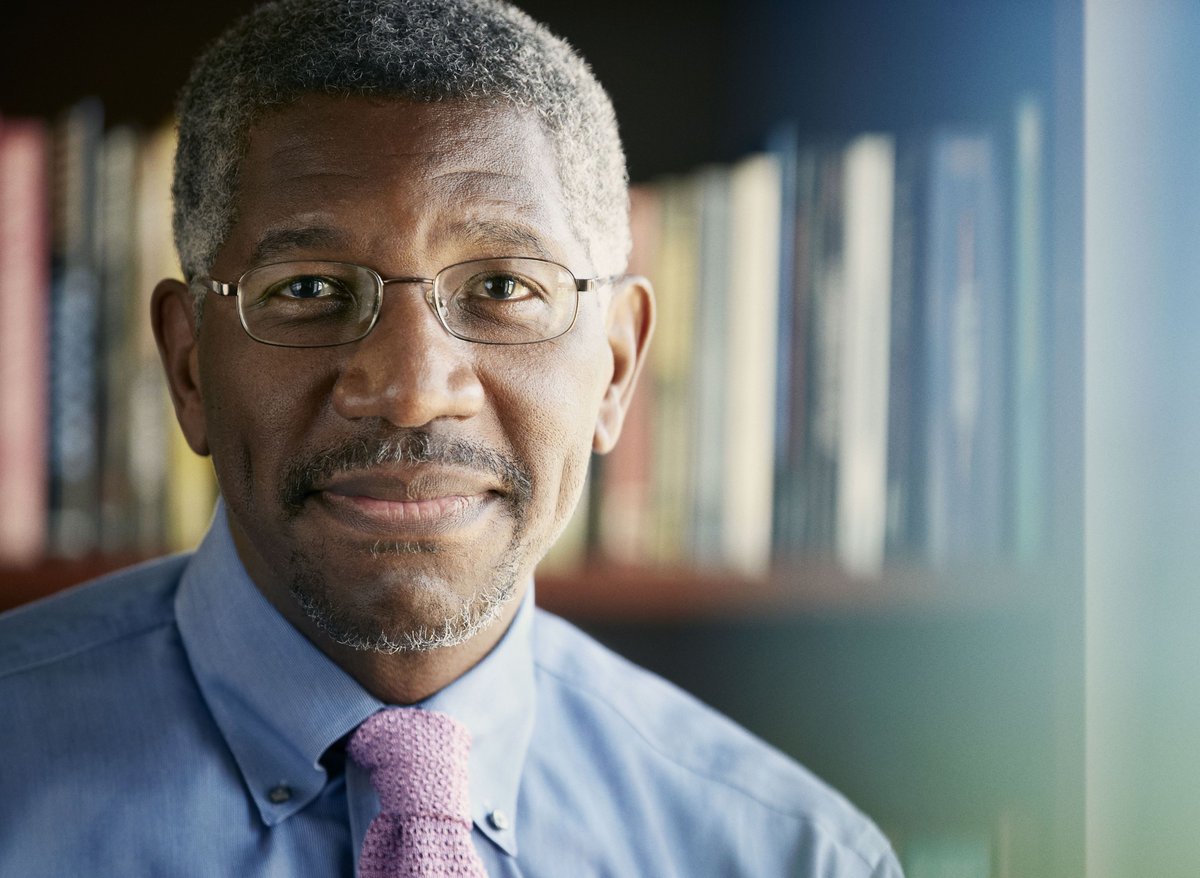
30)
"For Thomas, the ongoing insistence on racial categorization is the inevitable result of protest politics, which revels in the charisma of the category as identity. What Black conservatives fear is that Black Americans overvalue the power and the repetition of protest, ...
"For Thomas, the ongoing insistence on racial categorization is the inevitable result of protest politics, which revels in the charisma of the category as identity. What Black conservatives fear is that Black Americans overvalue the power and the repetition of protest, ...
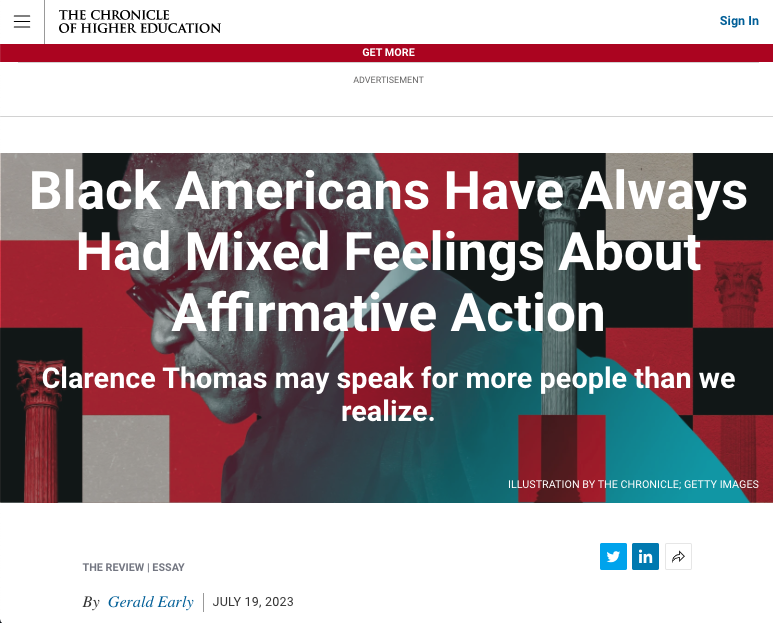
31)
"...which intensifies our experience as an immutable social category, which is why Black conservatives complain so much about Black people clinging to victimhood. This is the category-binding that denies Black people transcendence, any hope of escaping race consciousness.
"...which intensifies our experience as an immutable social category, which is why Black conservatives complain so much about Black people clinging to victimhood. This is the category-binding that denies Black people transcendence, any hope of escaping race consciousness.
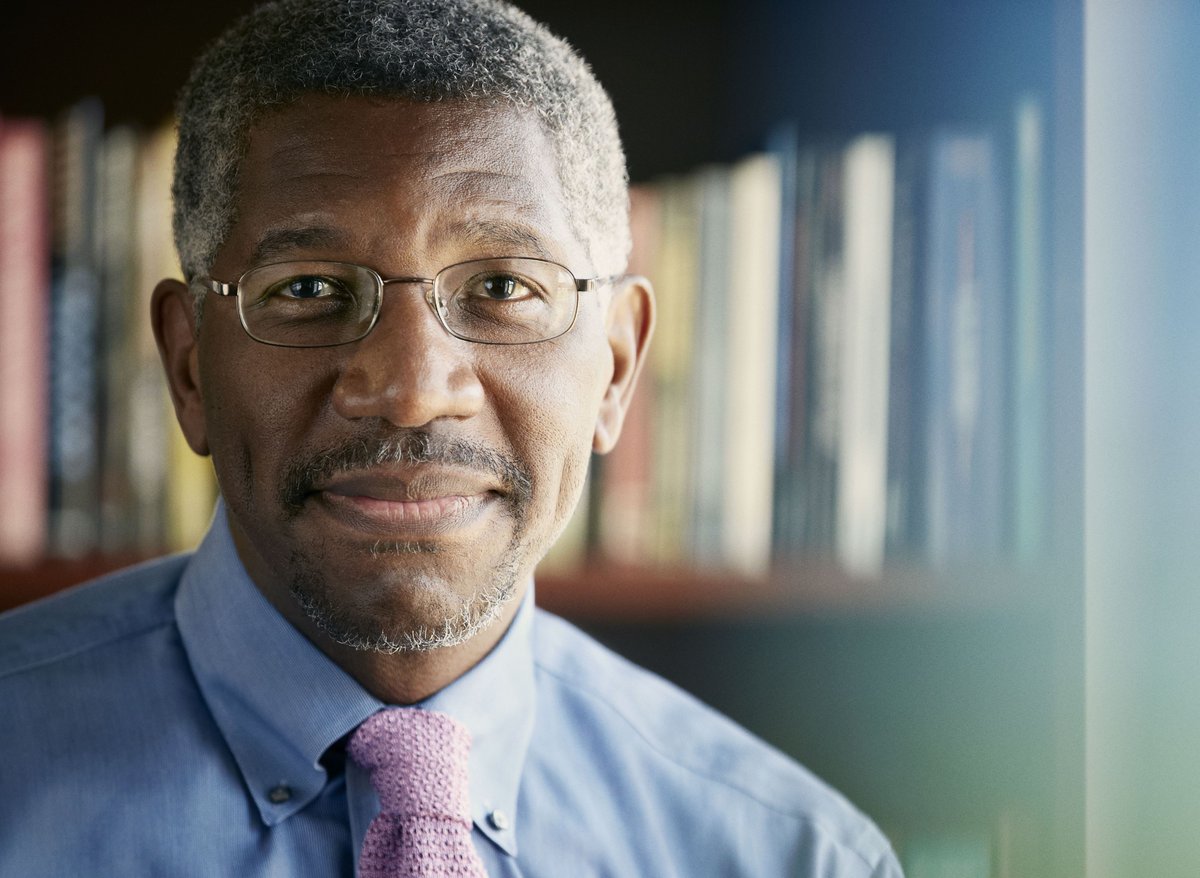
32)
"To glorify protest, Thomas and other Black conservatives argue, is simply to reduce Black people to anger and reaction.
"To glorify protest, Thomas and other Black conservatives argue, is simply to reduce Black people to anger and reaction.
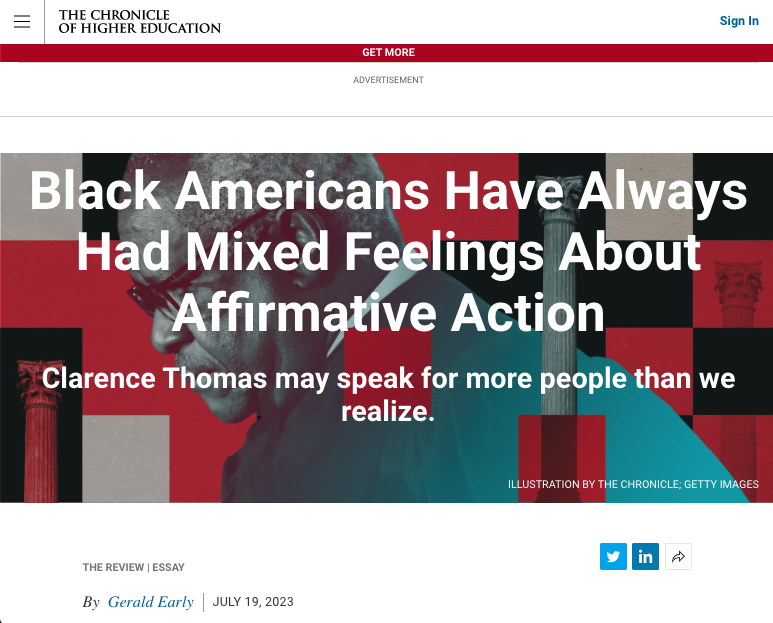
33)
"There has been much mourning for affirmative action among liberals of all races in the past couple of weeks. But a recent Economist/YouGov survey found that 44 percent of Black people supported the court’s decision to end affirmative action, while only 36 percent oppose it.
"There has been much mourning for affirmative action among liberals of all races in the past couple of weeks. But a recent Economist/YouGov survey found that 44 percent of Black people supported the court’s decision to end affirmative action, while only 36 percent oppose it.
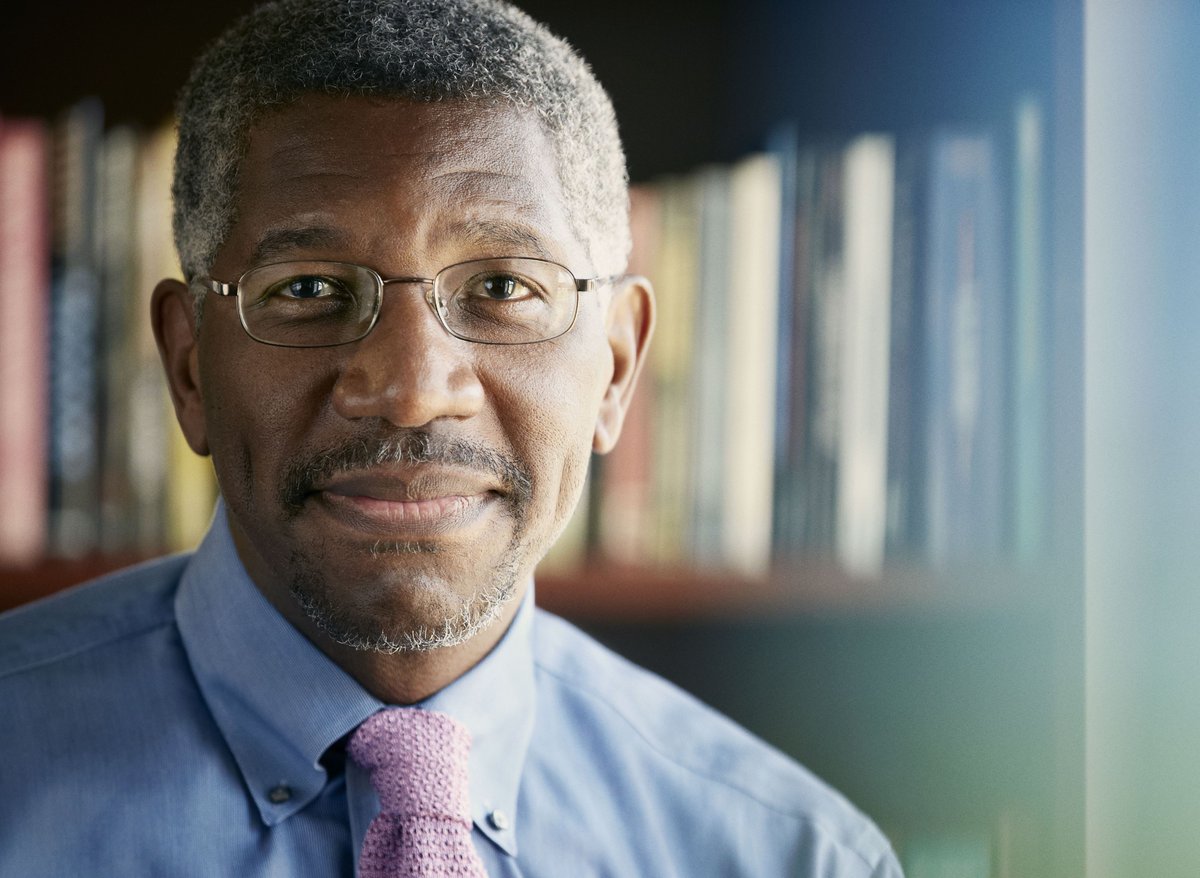
34)
"Perhaps affirmative action has been more of a burden on us than we have been willing to admit, and Thomas’s triumph may speak for more Black Americans than we realize.
"Perhaps affirmative action has been more of a burden on us than we have been willing to admit, and Thomas’s triumph may speak for more Black Americans than we realize.
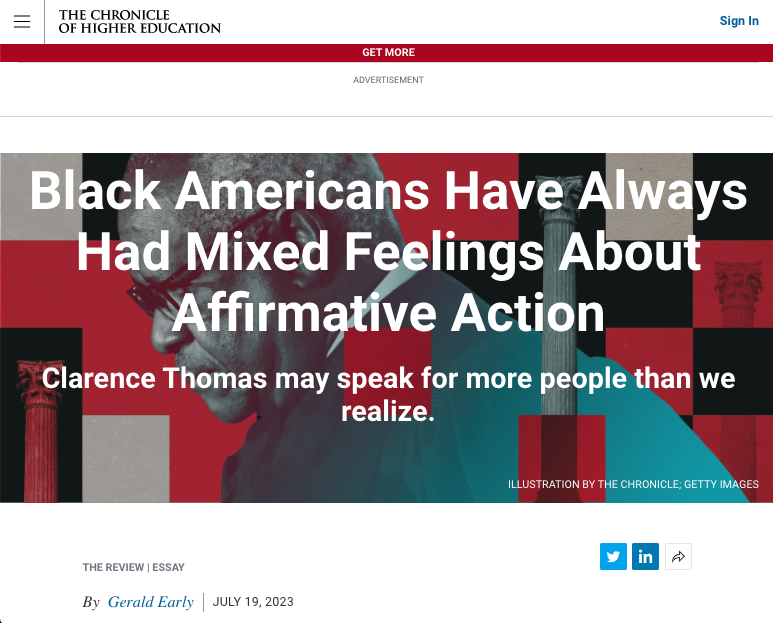
35)
"Will the strange hope in colorblindness in a country crazed by color save us from the tyranny of our categorization? It is actually touching that some Black folk think it can."
—Gerald Early, Professor of English and African-American Studies @WUSTL
chronicle.com/article/black-…
"Will the strange hope in colorblindness in a country crazed by color save us from the tyranny of our categorization? It is actually touching that some Black folk think it can."
—Gerald Early, Professor of English and African-American Studies @WUSTL
chronicle.com/article/black-…
• • •
Missing some Tweet in this thread? You can try to
force a refresh




